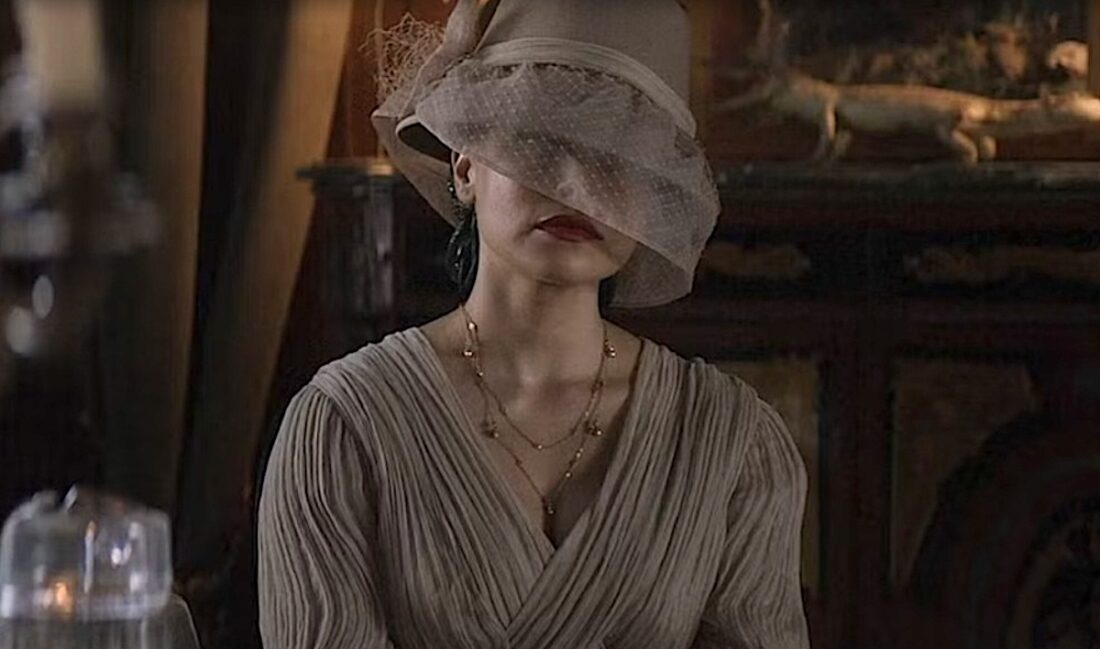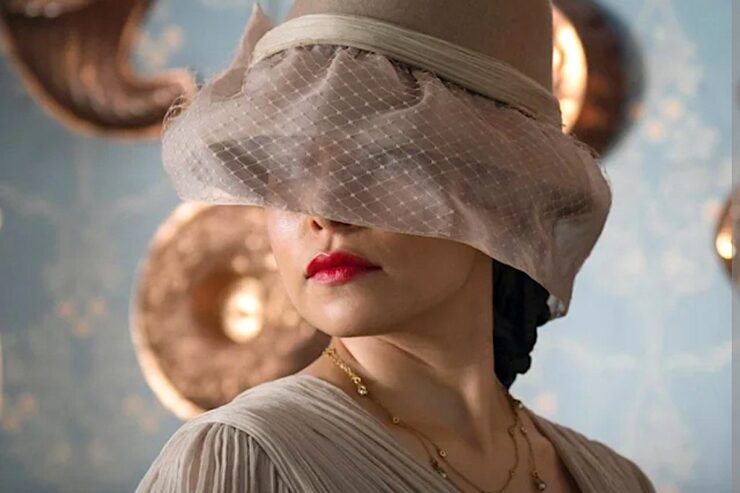It’s no surprise that my house is a bookish one or that my children went through intense reading phases with popular books. A shift happened in our house when they wanted to move from reading books together, to having books that are their very own. My daughter forbade me from reading Twilight and my sons similarly said Percy Jackson would be only for them. Three boys means three Percy Jackson phases, so, yet again, my house is all Greek gods, all the time.
One of the best parts of having bookish people who can watch their beloved characters on the screen is dissecting the depictions because, let’s face it, it’s never the same as it is in your imagination. Something will always be off, something will always be altered, but, in our house anyway, combing over the differences between page and screen, and how the medium alters the story or characters, is just as much fun.
Now, as I’ve just confessed, I haven’t read the Percy Jackson books. I do (sometimes at least) listen to my children. For something as sacred as books, I definitely do (posting a cute baby photo now and then among groans of “Moooom”? Not so much). Despite not reading the books, I know Greek myths, and so we had plenty of discussions over the years about gods, goddesses, demi-gods, muses, and monsters—my children were always well aware of my feelings of certain characters, namely the monsters. Sure, god powers are awesome and all, but breathing fire to roast my enemies? Wings that can sprout out my back to fly full force into someone? A voice that could lure men to their doom? That’s way more interesting than just being godlike. But none held a place in my heart quite the way Medusa has for all these years, and so the evolution of how we view her, particularly within the world of Percy Jackson, is something we’ve discussed quite a bit.
Percy Jackson and the Olympians’ revision of Medusa on the TV show from monster to victim to survivor is partly thanks to the inimitable Sally Jackson, portrayed by the amazing Virginia Kull, who impressed upon Percy his whole life that not only were these not merely stories, but the renditions passed down were skewed, if not all together wrong. She did what readers do about page to screen versions: dissect, examine, critique. Between her and Echidna, played by the equally captivating Suzanne Cryer, they offer a different view of what it means to parent, namely that they are to be present to foster their children throughout their lives, to encourage their skills and abilities, to show love by showing up, not use their offspring for their own aims or ignore them unless otherwise convenient.
But Athena. Fucking Athena.
Many bookish girls and young women are compared to—and assumed to love—Athena. She is the goddess of wisdom, after all! Who else would you want to be if not her? Aphrodite would prove you too shallow, Artemis too singularly focused, Demeter or Hera too boring. Persephone is the only runner up, but the Athena comparison and aspiration remained constant.
Listen, Athena did some cool stuff and avenged women sometimes. Sure. And no one is all the way perfect, but Athena sometimes needed to take a fully deep breath before acting. Not that gods or goddesses are wont to do that, but at the same time, Athena, come on. Just come on. We get that you love your places of worship, and there are ever so many of them, but cut some of your priestesses some slack, ok? Not to mention your daughters. Some need a safe place to meet their lover or give birth or hide from rapists. For the Goddess of Wisdom to be so blind as to why some of her devotees need refuge is a little too much on the nose.
At the very least, let’s not turn them into monsters.
As the Goddess of Wisdom, the stories were always bent to her favor. These women had offended Her Grace somehow. The punishment was warranted.
Except it wasn’t. Not even a little bit.

Imagine my delight when the exquisite Jessica Parker Kennedy shows up as Medusa in the Disney+ Percy Jackson series dressed to the nines in all her calm serenity, and not only challenges the narrative, but the very daughter of Athena herself. Yes, this plays into the story arc for the first season that something is off about the gods and goddesses’ judgment of humanity and their children, but it also makes the characters in the myths much more real. Medusa was a victim twice over, three if you count the fact that she firstly devoted herself to a goddess who was never going to give her the time of day despite her servitude (something Medusa alludes to as she recounts her story) and as a memento, has snakes swirling about her head forevermore—albeit with one really awesome super power.
Save the fact that it means she’ll never have what she craved most, which is connection with someone else.
Thanks Athena. Way to cool girl your way around the world.
More than that, though, Medusa’s story in the Disney+ series drives home the fact that there are plenty of people in that world who know how little the gods care, and how that torturous feeling leads them to desperate measures, from being willing to turn demi-gods (children at that) to stone, to cavorting with child-eating Kronos—always a bad idea. And even if they don’t resort to anything that bad, they are left grappling with fear and insecurity about their parents.We see Annabeth struggle with connecting to her mother, Athena, who seemingly only ever makes her displeasure known, rather than bestowing her grace to those who adore her. Not being a doting mother is one thing, Athena is busy and has goddess-y tasks to do, but not being a proud mother is quite another. Punishing those who worship her is a choice she makes again and again.
In the original book when Percy meets Medusa in The Lightning Thief, she tells her own story, but with a narrative arc that goes back to Ovid, an arc that Annabeth and her both agree on: Medusa was at fault for angering Athena, thereby making Medusa evil and vindictive.
“You see, Annabeth, a bad woman was jealous of me, long ago, when I was young. I had a… a boyfriend, you know, and this bad woman was determined to break us apart.”
—Medusa, The Lightning Thief
I’m going to pretend that what takes place in those ellipsis is Riordan grappling with how to tell Medusa’s story; Medusa is still at fault, but here she owns it—though the ellipsis notes her apprehension. From Ovid’s rendition, people typically argue if Athena was punishing Medusa or saving her rather than casting her as victim or seducer. The ellipsis, though, tells us that neither of them, not Medusa nor Riordan, fully believed it. Later, in his book relating Greek myths, Riordan does say this about Poseidon and Medusa in Athena’s temple:
“Now, I’m not going to excuse Poseidon’s behavior. He knew very well that Athena would get angry. He was using Medusa to get revenge.”
—Percy Jackson’s Greek Myths
The narrator does say that “Medusa should’ve said no,” but declares that gods are “pretty charming.” Really, though, who says no to the gods and lives to tell the tale with their own human mouth?

In the show’s update to Medusa’s myth from Riordan and his writers room, Percy, Annabeth, and Grover meet Medusa in 2023, and Medusa tells them that she’s not a monster, but a survivor. Percy reinforces this idea, saying that his mom told him that Medusa isn’t what people think. Annabeth remains wary and it’s to her that Medusa makes her appeal.
“Athena declared that I had embarrassed her and I needed to be punished. Not him. Me. She decided that I would never be seen again by anyone who would live to tell the tale.”
—Medusa, Percy Jackson and the Olympians, “We Visit the Garden Gnome Emporium”
Annabeth still declares her “a liar” and that her mother is “just, always,” but the move from Medusa as solely a monster to a victim, and even a survivor, of the gods’ wrath strikes a chord with Percy, who, unlike those brought up with the gods like Annabeth or Luke or Grover, can see the people and monsters behind the stories–people who had to live with very real consequences. Part of Percy’s journey is people telling him that myths are not simply stories, so that he accepts his fate, but his friends have yet to realize what Percy knows thanks to his mother: these people aren’t simply their stories.
Now whole legions of children will look at the acts of gods slightly differently. They’ve done this since the Percy Jackson books first appeared, but they can continue to revisit the myths from different perspectives to make them fit how we view the world. For the Medusa myth, the books and the show (and even the movie, don’t be mean) illustrate how women are treated by violent men, and then by the women who throw the blame at the feet of the victim, so that we have a more fitting description of the story: Poseidon was a player, Athena a shrew, and Medusa a victim.
Or, as my kids say, Poseidon needs lessons on consent and Athena maybe needs a hobby.
What Medusa does afterwards with her rage is another story all together (I’m not going to condone child statues, after all), but the impetus of how she came to be Medusa the Monster is at least more nuanced and real for our world. More real than a Medusa who transgressed against people she revered, and was supposedly justly punished for not being sufficiently pious or adoring. And, as my kids said, she may have been wronged at the beginning of her story, but the choices she made since then were all her own.
She’s still a cool monster, though.
The lesson to be remembered, however, is one that obviously benefits me: always listen to your mother, kids (at least about monsters).










